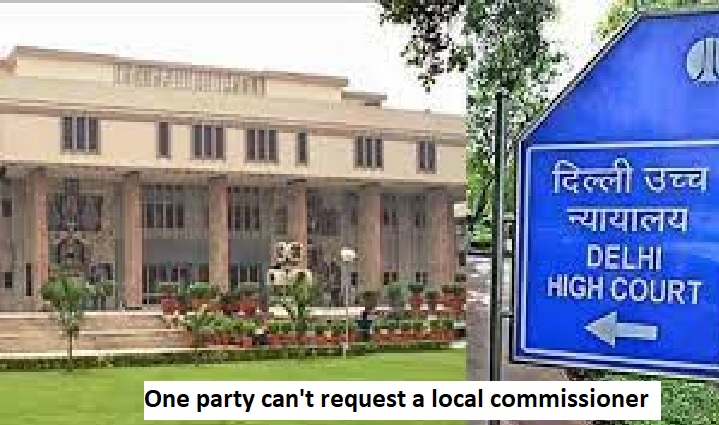


In an application where the appointment of a Local Commissioner (LC) was sought, the Delhi High Court ruled that parties cannot seek such appointments solely to strengthen their cases with the acquisition of the "best evidence" against others. The court's decision underscores the principle that the appointment of a Local Commissioner should serve a legitimate purpose related to the proceedings and not be misused as a tool to gather evidence to gain an unfair advantage over the opposing party. This ruling emphasizes the importance of fairness and integrity in legal proceedings, ensuring that the appointment of Local Commissioners serves the interests of justice
Justice C. Hari Shankar highlighted that Order 26 Rule 10A CPC, which authorizes courts to issue commissions, should be utilized when the court deems that (i) resolving suit issues requires scientific investigation, (ii) such investigation cannot be feasibly conducted in the court, and (iii) it is necessary for the interests of justice to issue the commission for conducting the scientific inquiry.
"The court emphasized that the simultaneous fulfillment of these three criteria is an essential prerequisite for the application of Order 26 Rule 10A."
It's important to highlight that the first criterion was described as a mandatory requirement, while the other two were considered discretionary.
The judgment was delivered in a lawsuit initiated by the plaintiffs, who claimed that the defendants' Preconditioned Air Units (PCAs) violated their registered patent (referred to as the "suit patent").
Advocate Pravin Anand, representing the plaintiffs, contended that the infringement accusation was not unfounded. Instead, it was substantiated by comparing the features of the defendants' PCAs with the claims outlined in the suit patent, using information from the defendants' brochures, instruction manual, and RFP (Request for Proposal).
He additionally argued that the court possessed the authority to grant the request in accordance with statutory provisions, including Order 26 Rule 10A CPC, as a scientific investigation was deemed essential. He also pointed out that the defendants' PCA machines were installed at airports and could not be examined in any other way except as proposed by the plaintiffs.
Conversely, the defendants argued that the plaintiffs' request constituted an unfocused and exploratory investigation, characterizing it as an abuse of the legal process. They alleged a lack of good faith and asserted that the plaintiffs should not be permitted to exploit the court system to obtain further evidence in favor of their case.
Furthermore, it was emphasized that the law did not allow for such an endeavor. It was also mentioned that the process of mapping the claims had been performed three times.
Advocate Rajagopal, representing defendant Nos. 1 to 3, also argued that if the court found the appointment of a Local Commissioner necessary at a later stage, it could appropriately exercise its authority under Order 26 Rule 10 CPC
Upon reviewing the records and considering the arguments presented by both sides, the court observed that the plaintiffs had acknowledged that a comprehensive mapping of the claims had already been conducted. Their request primarily aimed to validate the claim of infringement of the suit patent through a physical assessment.
Regarding the plaintiffs' reference to Rule 5(i) and (iii) of the DHC Patent Rules, which allow a patentee alleging infringement to request the appointment of a Local Commissioner for "inspection, etc.," the court clarified that the term "etc." had to be interpreted using the legal principle of noscitur a sociis or ejusdem generis in conjunction with the term "inspection." This meant that any purpose specified by "etc." would have to be in line with the concept of "inspection."
Based on the circumstances of the case, the court determined that "etc." could not be stretched to encompass the plaintiffs' request.
The plaintiffs cited the Sotefin SA v. Indraprastha Cancer Society case to support their argument. Nevertheless, Justice Shankar differentiated it by highlighting that it was a case in which specific questions were raised during arguments, leading to a deliberate decision on the need for scientific investigation.
Moreover, the court concurred with the defendants' argument that since the plaintiffs had asserted that they had presented enough evidence to prove infringement, and the defendants had not contested the materials used for mapping, there was no valid reason to appoint a Local Commissioner as requested.
By interpreting the language found in Order 26 Rule 10A CPC, the court emphasized that it could not establish a local commission for inquiries without proper justification.
In conclusion, a cautionary note was expressed as follows: "The court must be acutely mindful that the report of such a Commissioner, if appointed, would serve as 'evidence.' The distinction between ordering a scientific investigation to assist in resolving issues in the case and unintentionally, even without any improper intent from the applicant, acting as a means to obtain evidence supporting their own case can be subtle. The court must exercise caution not to cross this line."
TAGS: caution court local commissioner evidence scientific investigation